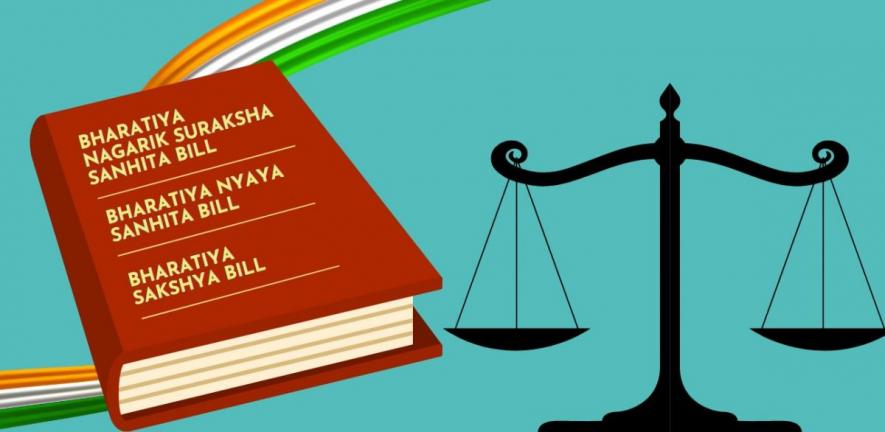By Nethra Katikaneni
Abstract
This article critically analyses the aspects pertaining to the introduction of the three new billsreplacing the existing laws which date back to colonial times and their impact in reforming thecriminal justice system. The three newly enacted criminal laws – Bharatiya Nyaya Sanhita 2023,Nagarik Suraksha Sanhita 2023 and Bharatiya Sakshya Adhiniyam 2023 will be reflected uponabout the changes bringing into the criminal laws and also discusses its concerns experts havepointed out along with its implementation in the country.
Introduction
During the Winter Session of 2023, both Houses of Parliament passed three historic bills
pertaining to the criminal justice system to ensure victim-centric justice: the Bharatiya Nyaya
Sanhita 2023, the Bharatiya Nagarik Suraksha Sanhita 2023, and the Bharatiya Sakshya Bill.These bills replaced the Indian Penal Code (IPC), 1860; the Code of Criminal Procedure,
1973; and the Indian Evidence Act, 1872. These three new criminal justice bills that were
approved by Parliament have received President Droupadi Murmu’s approval replacing British-
era criminal laws. Currently serving as the 31st Minister of Home Affairs, Amit Shah said the bills are based on three principles: “A person’s freedom, human rights and impartiality”. He added that the three new laws “reflect the spirit of the original Indian Code of Justice”. The three newly-enacted criminal laws passed during the winter session of Parliament are set to come into effect from July 1 as per a government notification.
Major provisions in the new bills and key changes made to the existing laws
1. Bharatiya Nyaya Sanhita, 2023:
This bill adds additional crimes such organized crime, terrorism, and group-related grievous hurt
or murder while keeping the same IPC rules on murder, assault, and causing hurt. In addition,
community service is added as a penalty. Acts that endanger national integrity or incite fear
among the public are classified as acts of terrorism. The severity of penalties varies from life in
jail or death to incarceration plus fines. Crimes classified as organized include financial frauds,
cybercrime, extortion, abduction, and more. For those who perpetrate, or attempt organised
crime, there are penalties and sentences ranging from life in prison to death.
Under herein, any murder or serious harm committed by five or more people based on a certain
group of people’s race, caste, or other characteristics is considered a crime that carries a life
sentence or the death penalty. This Act increases the age limit for victims of gang rape from 16
to 18 years old while keeping the IPC provisions on rape, voyeurism, and other offences. It also
makes fraudulent sexual activities or false promises illegal. It does away with the sedition
offence and substitutes it with penalties for actions pertaining to secession, armed rebellion, or
actions that in any way jeopardize the integrity or sovereignty of the country. Under Section
304A of the IPC, the Bharatiya Nyaya Sanhita increases the penalty for causing death by
negligence from two to five years. It does state, however, that doctors will still be subject to the
lesser sentence of two years in prison if found guilty. The bill also complies with certain rulings
of the Supreme Court by eliminating adultery as a crime and adding life in prison to the death
penalty for murder or attempted murder committed by a life sentence prisoner.
2. Bharatiya Nagarik Suraksha Sanhita, 2023:
Significant changes are brought about by the Bharatiya Nagarik Suraksha Sanhita, 2023 which
replaces the Criminal Procedure Code, 1973 (CrPC). The recent bill modifies the guidelines for
undertrials, prohibiting the release of defendants on personal bail in circumstances involving
serious offences, such as those involving life imprisonment or several counts. It makes the
process more accessible by extending the eligibility for medical examination requests to all
police officers, not only sub-inspectors. Forensic investigation is required for offences carrying a
minimum sentence of seven years in jail. Experts in forensics must gather evidence at crime sites
while electronically documenting the procedure. States with no forensic resources should make
use of those in neighboring states. It extends beyond the CrPC’s specimen signatures or
handwriting orders to include the ability to obtain voice and finger impressions from those who
are not in custody.
The Bharatiya Nagarik Suraksha Sanhita establishes stringent deadlines, including five days for
medical reports on rape victims, thirty days for judgements (which can be extended to forty-five
days), ninety days for victim progress updates, and sixty days for charge framing following the
initial hearing. From Magistrate’s Courts to the Supreme Court, India’s criminal courts are
arranged hierarchically according to the CrPC. The new bill does away with the distinction and
the function of Metropolitan Magistrates, which was formerly permitted for cities with a
population over one million.
3. Bharatiya Sakshya Bill, 2023
The Indian Evidence Act of 1872 (IEA) is replaced by the Bharatiya Sakshya Bill, 2023. Most of
the IEA’s rules, including those regarding confessions, the relevance of the evidence, and the
burden of proof, are still in place. However, the replaced bill brings about several important
changes in the criminal laws. It adds electronic records to the list of documents, in addition to
traditional written works, maps, and cartoons. Original documents, computerised records, and
video recordings are all considered primary evidence. Admissions made verbally and in writing,
as well as the testimony of a qualified witness who has reviewed the records, are regarded as
secondary evidence. It also allows for the electronic submission of oral evidence, which means
that victims, accused parties, and witnesses can all testify electronically. Digital or electronic
documents have the same legal standing as paper documents including data kept in voicemails,
emails, server logs, smartphones, computers, and semiconductor memory.
Criticism faced regarding these bills
There has been harsh criticism from a number of opposition members who claim that even while
it updates the Colonial law, it retains the harshest aspects in it. Regarding this debate, Congress
MP Shashi Tharoor said, “Over the past ten years, we have frequently witnessed this
Government, under the pretence of decolonizing our minds and updating colonial era lore,
bringing in legislation that is equally, if not more, arbitrary and unreasonable, and that most often
encroaches upon the fundamental rights of countless Indians. This Bill eliminates the
accountability that a state organisation like India Post is constitutionally required to bear, even as
it attempts to amend a colonial statute. It also keeps its harsh and colonial features. Sadly, it
provides no fresh concepts to update our post offices for the twenty-first century”.
Experts have noted that the three amended bills represent a lost chance to address broad police
powers that exacerbate state control and widespread overcriminalization. It’s important to note
that one of the significant provisions has been changed subsequently which also gained a lot of
attention. The Bharatiya Nagarik Suraksha Sanhita increases the 15-day maximum police
custody period under general criminal law to 60 or 90 days, depending on the type of offence.
Our existing legislation restricts police detention to the first fifteen days following an arrest.
Exposure to police excesses is increased by the expansion under this proposed bill. This is an
alarming extension of police power, given the generally held concerns about the safety of
arrested individuals in police custody and the increased possibility of coerced and falsified
evidence following extended detention. Human rights advocates have brought attention to the
fact that police custody is typically where most torture incidents occur. Five persons in India die
in jail on average every day, according to a 2020 report by the National Campaign Against abuse,
a platform of NGOs. Some of these individuals pass away because of abuse while in the hands of
the police or courts. The second item of legislation, the Telecommunications Act of 2023, aims
to update India’s telecom legislation, which dates back over a century. Yet, other experts caution
that the new bill will weaken privacy protections and permit indiscriminate spying. The
Telecommunications Act introduces biometric user authentication, creating privacy issues, and
simplifies the licensing process for telecom networks. It also establishes a framework for
message interception and internet suspension without any safeguards. The new criminal statutes
also include offences that are covered by separate laws, such “terrorism” and organised crime,
into regular criminal statutes without the necessary protections. Critics argue that the additional
clauses in the new criminal legislation will cause delays and setbacks in the court system. The
Indian justice system is beset by almost 50 million outstanding cases. They also anticipate
challenges in aligning the changes with existing laws and systems.
Author’s Bio
Nethra Katikaneni is a law student at Jindal Global Law School, OP Jindal Global University
and is a columnist at Nickeled and Dimed.
Image source: https://www.newsclick.in/what-does-indianisation-and-reform-mean-context-3-
new-criminal-law-bills

